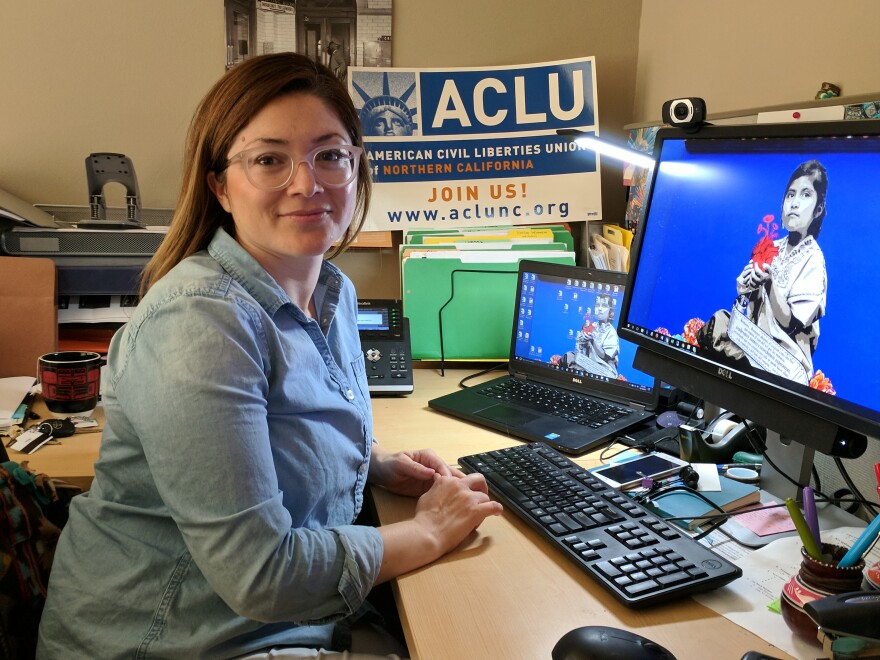Earlier this year, we reported on a new immigration policy in Madera County: Whenever the county jail was releasing a foreign-born felon back into the community, it would coordinate that release with U.S. Immigration and Customs Enforcement, or ICE, which could potentially detain or deport that felon. But when a civil rights group looked into the policy, it uncovered a problem—one that could amount to a violation of an open meeting law. It’s something the city of Bakersfield may be facing as well—the latest in a series of open government concerns in the Valley.
According to a press release written by the Madera County district attorney, the new policy was enacted during a meeting of the county board of supervisors in March.
It caught the attention of Angelica Salceda, an attorney with the American Civil Liberties Union. She wanted to know more, but when she combed through the minutes from that board of supervisors meeting, she found no record of the policy ever being discussed. What was on the agenda was a closed session about a staff member: The director of the county jail, who’s entangled in this new policy.
Salceda submitted a public records act request for more documents. “From the district attorney’s press release, from other public documents that we were able to obtain, it was very clear that what the board did in closed session in a secret meeting was to adopt an entirely new policy for Madera county,” Salceda says.
"You can't hold the government accountable if you don't know what the government's doing."--David Snyder, First Amendment Coalition
If true, this would be illegal—a violation of the Brown Act, a state law that regulates how local agencies make policy decisions. The foundation is that public policies should be enacted in public, not in closed session. Salceda and the ACLU sued. “It's incredibly disappointing that a legislative body that should be intimately familiar with the Brown Act requirements would violate those requirements, would do something in secret,” she says. “They should well know that these types of policy discussions should be done in public.”
The case is ongoing. For its part, Madera County has flat out denied the allegations. County officials turned down an interview request but did issue a statement. It claimed the ACLU’s allegation “has no legal or factual merit,” and asserted that the closed session in question was “rather routine.”
Concerns about the Brown Act have surfaced elsewhere in the Valley as well. The Bakersfield Californian last week alleged that city officials there had potentially broken the law by discussing tax policy during a closed session about litigation. The city has claimed no wrongdoing. Another accusation arose following a recall election of the Tulare Local Healthcare District board of directors, though the district attorney there determined there had been no violation.
However the Madera and Bakersfield cases are resolved, they still represent concerns about transparency in the Valley’s local governments. “Transparency of that sort is ultimately what allows the people to hold their government accountable, which is really the linchpin for how our democratic system works,” says David Snyder, executive director of the First Amendment Coalition, a non-profit that advocates for free speech and transparency. “You can't hold the government accountable if you don't know what the government's doing.”
He says one purpose of the Brown Act is to facilitate public participation in local government, but it does allow for exceptions. Governing bodies can go into closed session to discuss things like personnel issues, pending litigation or public security. But those exceptions are very narrowly defined. It can be illegal during a closed session to merely change in subject—much less adopt a whole new policy.
Snyder says, from his understanding as an outsider, officials both the Madera and Bakersfield cases misused those exceptions. “Based on what we know, there's a high likelihood that those legislative bodies didn't adhere to the Brown Act's requirements,” he says.
Because most Brown Act violations occur behind closed doors, Snyder guesses the law is actually violated relatively often, though accusations rarely result in litigation.
And violations shouldn’t happen by accident. State law requires elected officials to take an ethics training every two years, which includes Brown Act basics. Still, it can be easy to steer conversation into a legal gray area—which is why Susan Anderson says elected officials should be extra vigilant of the law. She sat on the Fresno County Board of Supervisors for 12 years before retiring in 2012. “Sometimes you're having a conversation about something and it just leads into a conversation about something else or it reminds somebody about something else,” she says. “So people had to be aware of it all the time.”
"It makes the actions of the board more cumbersome, but it's the state law, and that's how the public has decided they want their business done."--Daniel Cederborg, Fresno County Counsel
That’s why closed sessions typically happen with a lawyer present who can warn officials when they’re veering into dangerous territory. Daniel Cederborg is County Counsel for Fresno and he’s sat in on dozens of closed session meetings trying to keep officials on the right side of the Brown Act.
“It makes the actions of the board more cumbersome, but it's the state law, and that's how the public has decided they want their business done,” he says.
But when business appears to not have been done that way, there can be consequences. David Snyder says if the city of Bakersfield doesn’t take corrective action, he and the First Amendment Coalition may sue city officials.
The ACLU’s lawsuit against Madera County will be taken up in its second hearing in November. It could still be months before the case is resolved. If the county loses, it’ll be required to reimburse the ACLU’s legal fees and open its immigration policy up for public discussion.



